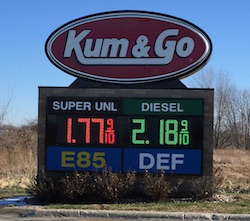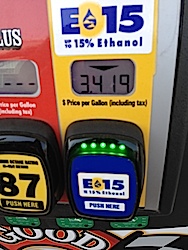Last week Congress approved the Omnibus Bill that included tax credit extensions for clean, renewable energy. One of these credits is for retail fuel station owners who buy equipment to offer alternative fuels such as E85. Ron Lamberty, American Coalition for Ethanol (ACE) senior vice president and a fuel retailer, says additional ethanol blends could further increase profitability for retailers.

Photo Credit: Joanna Schroeder
The Alternative Fuel Vehicle (AFV) Refueling Property Credit until the end of next year, according to Lamberty. The credit, which allows retail gas station owners to claim a 30% tax credit, up to a maximum of $30,000 per location for qualified AFV refueling infrastructure, originally expired on December 31, 2014.
“Marketers who saw the opportunity to gain new customers by offering E85 at the pump, also saw they could increase profits by selling the RIN credits they earned for selling higher ethanol blends. Some added pumps earlier this year, others will, in 2016,” said Lamberty “E85 compatible equipment costs more than standard or E25 compatible fueling equipment, and this credit helps offset some of that additional cost. That means retailers can pass the lower price of E85 through to consumers sooner, increasing volume and RIN profits, which most station owners use to reduce E85 prices even further.”
That means, says Lamberty, retailers can pass the lower price of E85 straight through to consumers, increasing volume and RIN profits, which most station owners use to reduce E85 prices even further.”
Lamberty pointed out that the credit is available for E85 fueling infrastructure only, and is scheduled to expire again at the end of 2016. “Fortunately, the equipment needed to sell ethanol blends up to E25 – including E15, adds only a few hundred dollars per dispenser,” he said.
“Having E15 – a lower cost, higher octane blend that 80 percent of the cars on the road can use – should justify that expense. And with a growing number of station owners, including innovative retailers like Kum & Go, Sheetz and Protec, adding E15, consumers will quickly become more familiar and be looking for E15,” added Lamberty. “Those retailers were already selling E85 in some locations, and are expanding offerings through USDA’s Biofuel Infrastructure Partnership (BIP) program. We’re hoping the availability of this tax credit inspires those companies and others to make higher ethanol blends available sooner, in even more places.”
 During a recent campaign stop in Iowa Republican presidential candidate Ben Carson said the promise of the Renewable Fuel Standard (RFS) needs to be kept through 2022.
During a recent campaign stop in Iowa Republican presidential candidate Ben Carson said the promise of the Renewable Fuel Standard (RFS) needs to be kept through 2022. 









